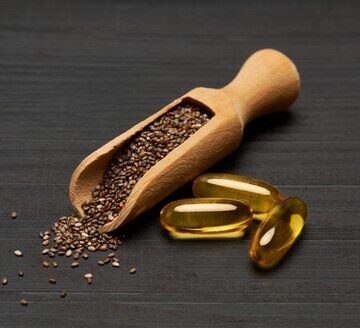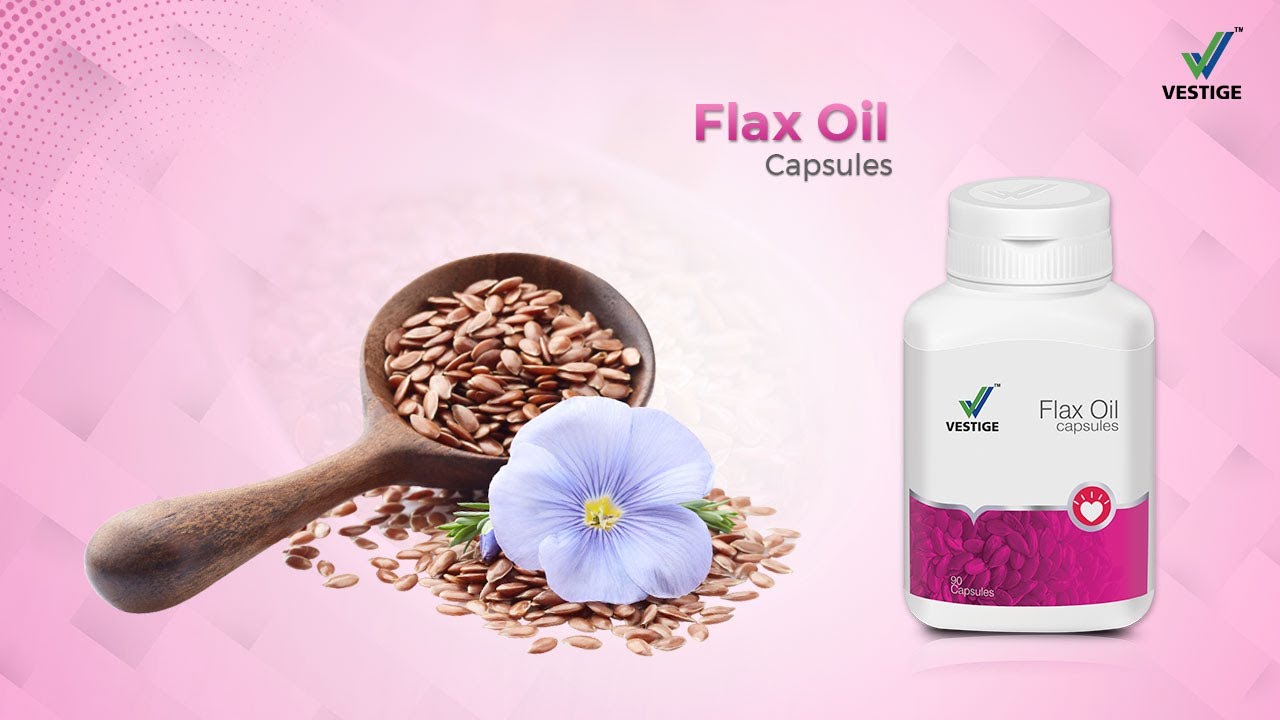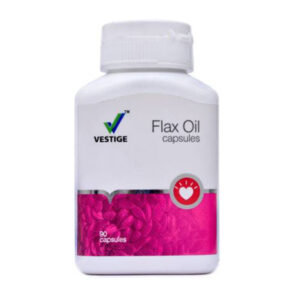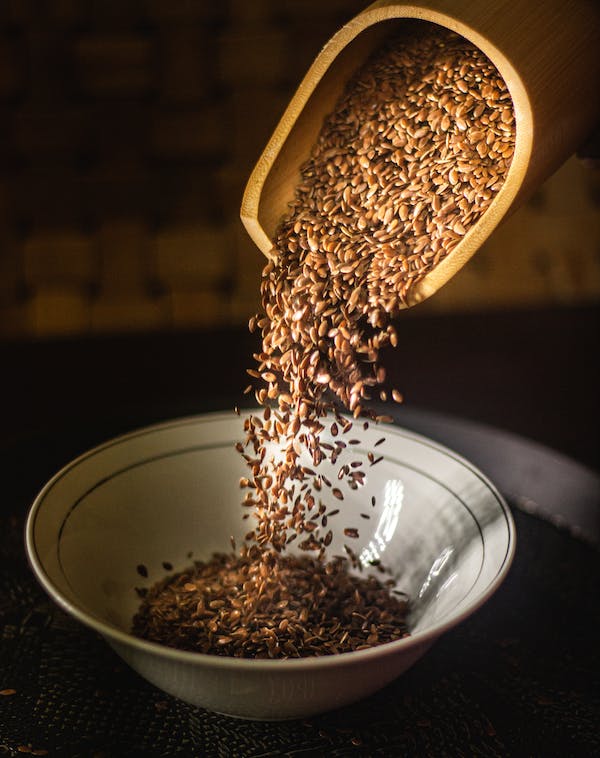Introduction:
Flaxseed oil, also called linseed oil or flax oil, comes from dried and mature seeds of the flax plant. Its scientific name is “Linum usitatissimum”, and it’s part of the Linaceae family. People have used flaxseed for a very long time, dating back to about 9000–8000 BC in places like Turkey, Iran, Jordan, and Syria. Flax is grown in many parts of the world especially in West Asia and the Mediterranean coastal areas, which include places like Asia Minor, Turkestan, Afghanistan, India, Egypt, Algeria, Tunisia, Spain, Italy, and Greece. Flax seeds are famous for their many health advantages, like providing a good amount of protein and fibre, reducing inflammation, managing cardiovascular and glycaemic health, improving heart health, and assisting in weight management. This article will talk about some of the best things about flaxseed oil and some easy ways to use it.

Flaxseed or Linseed Plant (Linum usitatissimum)
Nutritional Value of Flaxseed Oil:
The nutritional value of flaxseed oil per 100g is as follows:
| Nutrient | Percentage Content |
| Protein | 0.11g |
| Calcium | 1mg |
| Phosphorus | 1mg |
| Zinc | 0.07mg |
| Choline | 0.2mg |
| Total fat | 99.98g |
| Fatty acids (total saturated) | 8.98g |
| Fatty acids (total monosaturated) | 18.4g |
| Fatty acids (total polyunsaturated) | 67.8g |
| Vitamin E | 0.47mg |
| Vitamin K | 0.0093mg |
Table 1: Nutrient values found in 100g of flaxseed oil

Benefits (Uses) of Flax Oil
Flaxseed oil may possess the following potential benefits (uses):
-
Anti-cancer Properties-
There are some experiments with test tubes and animals that suggest flaxseed oil might reduce the growth of cancer cells. This is because flaxseed oil has something called alpha-linolenic acid (ALA) and lignans, which could be helpful in fighting cancer cells. But, we can’t be sure about these effects on people just yet. We need more research to understand if these findings will also work for humans. (Finalised)
-
Improves Heart Health-
Some studies have shown that flaxseed oil
could improve cardiovascular health. Various studies have shown that due to the presence of Omega-3, Omega-6 & Omega-9 fatty acids, flaxseed oil may improve heart health by reducing bad cholesterol (LDL), increasing good cholesterol (HDL), improving the elasticity of the arteries and lowering blood pressure. The alpha-linolenic acid (ALA) present in the flaxseed oil may help reduce triglycerides. It may also lower the very low-density lipoproteins (VLDL) or bad cholesterol in the liver. (Finalised) -
Promote Gut Health-
Flaxseed oil has been used for a long time for its laxative properties. Even back in 650 B.C., Hippocrates, the father of medicine, recommended using flax to relieve stomach pains. Theophrastus, the father of botany, suggested using flax mucilage to treat coughs. Some recent studies have shown that flaxseed oil can be good for your gut. One study with 50 people who were getting haemodialysis (a treatment to clean the blood) found that taking flaxseed oil every day helped with constipation. Another study with 75 people who had ulcerative colitis, a type of gut problem, found that flaxseed and flaxseed oil could reduce inflammation, make the disease less severe, lower blood pressure, and even reduce waist size. For people with haemorrhoids or piles, flaxseed oil can be helpful because its fibre structure can make it easier to pass stool in our intestines, which can ease constipation. So, in short, flaxseed oil seems to be proved good for our gut health.
-
Improve Skin Health-
Flaxseed oil might help your skin and hair look and feel better. In a small study, 13 women took flaxseed oil for 12 weeks. After the study, they had smoother and more hydrated skin, and their skin wasn’t as sensitive or rough. Flaxseed oil can also help speed up the healing of skin problems like psoriasis and sunburns.
-
May Reduce Inflammation-
Flaxseed oil contains omega-3 fatty acids, which are commonly believed to reduce inflammation. But when researchers looked at studies in people, they got different results. In one review of many studies, they found that flaxseed did lower a marker of inflammation called C-reactive protein (C-RP). In another study that looked at 12 different research papers, they saw that flaxseed oil reduced two other markers of inflammation called interleukin-6 (IL-6) and malondialdehyde (MDA). Some studies suggest that flaxseed oil might not help with inflammation. So it’s not the same for everyone, and we still need more research to be sure how it affects inflammation in most people.
-
Potential uses in Arthritis (gout)-
Flaxseed has got alpha-linolenic acid or omega-3 in it that might make the swelling in your joints go down. It could also lower the high cholesterol that sometimes appear with gout. So, using flaxseed oil might help with the swelling and pain in gout. But we need more studies to be sure it really works. Don’t try it on your own because it could have bad side effects. Always talk to a doctor first.
-
Potential uses for wound healing-
If your body does not have enough of the important fatty acids it needs, it can make healing wounds difficult. Flaxseed oil has these fatty acids called linoleic acid (omega-6) and α-linolenic acid (omega-3), which could help your body make certain substances that speed up healing. But, always see a doctor for proper diagnosis and treatment.
-
Reducing diabetes risk-
Flaxseed oil might help lower the risk of diabetes. In one study, they looked at 25 people who were on the edge of getting diabetes. These folks were either women going through menopause or overweight men. They ate either 13 grams or 26 grams of flaxseed every day for 12 weeks. After that time, the ones who had 13 grams of flaxseed had lower blood sugar levels. But the folks who ate more flaxseed didn’t see any changes.
The researchers aren’t exactly sure why the people who had more flaxseed didn’t see improvements. So, while it seems like flaxseed oil could be good for people with prediabetes, we need bigger and more detailed studies to be really sure about it.
Vestige Flax Oil
Flax oil or linseed oil (Linum usitatissimmum) or Alsi/Tissi ka tel, as it is known in India, is the richest vegetable source of Omega-3 & Omega-6 fatty acids. Flax contains a mixture of fatty acids. It is rich in polyunsaturated fatty acids, particularly Alpha Linolenic Acid (ALA), the essential Omega-3 fatty acid, and Linolenic Acid (LA), the essential Omega-6 fatty acid. These two polyunsaturated fatty acids are essential for the human body. The ALA from Flax seed exerts a positive effect on blood lipids. They are “good” fats that have been shown to have heart-healthy effects. Flax seed oil is also a rich source of Vitamin E, which is a powerful antioxidant required for maintaining the integrity of cell membranes by protecting it from harmful oxidative free radicals. Flax seed oil has a high quantity of magnesium and potassium, which plays a key role in regulating blood pressure naturally and is beneficial to the cardiovascular system.

Benefits of Active Ingredients
- Flax seed (Linseed oil) is a rich source of Omega-3 and Omega-6 that have cholesterol and blood pressure lowering properties. These
ingredients help in the prevention of clots in the arteries. The Alpha
Linolenic Acid and lignans present in it help decrease inflammationand promote healthy immune system functioning.
- It is good for women of all ages as it might help in normalising the
menstrual cycle and easing menopause.
- Flax seed is also helpful in improving eyesight and helps shorten
recovery time for fatigued muscles after exertion.
Product Details

Name : Vestige Flax Oil
Brand : Assure
Form : Capsule
Quantity : 90 Capsules
Shelf Life : Best before 24 months
Veg/Non-Veg : Veg
Country of Origin : India
Company : Vestige Marketing Private Limited, Okhla, New Delhi
Dosage
Each soft gelatin capsule contains Flax seed Oil (Linseed Oil) 500 mg.
Dosage recommended one capsule thrice a day after meals or as prescribed.
Why You Should Consider Flaxseed Oil Supplements?
The American Heart Association suggests adding healthy fats like flaxseed oil to your diet. Eating these fats in moderation (1000mg daily) can lower the chance of heart problems. Research has shown that taking flaxseed oil supplements can boost the levels of omega-3 fatty acids in your body, like Eicosapentaenoic acid (EPA) and docosahexaenoic acid (DHA). These EPA and DHA are important for keeping your heart healthy and preventing heart diseases. The ALA in flaxseed oil gets changed into EPA and DHA in your body. Flax oil is always recommended to consume in capsule form from a recognised neutraceutical company.

Side Effects
Flaxseed oil is likely safe for most adults. Adverse effects are rare and typically mild. The larger doses can cause side effects such as gas, bloating, loose stools and diarrhoea. Allergic reactions are also possible. However, these side effects can be minimized by taking flaxseed oil with plenty of water and by taking it as per recommended doses.
Special Precautions/Warnings
Don’t use flaxseed oil if:
- You are allergic to it or its ingredients.
- You are pregnant because it might not be safe and could increase the risk of having a baby too early.
- You are a child. We don’t have enough information to know if it’s safe for kids, although small amounts of flaxseed might be okay.
- You are breastfeeding. There’s not enough good information about whether it’s safe for nursing moms.
- You have a bleeding disorder. Some people think flaxseed oil could make bleeding more likely. If you have a bleeding problem, talk to your doctor before using flaxseed oil in your food, as a supplement, or on your skin.
- You are about to have surgery. You should stop using flaxseed oil before surgery to avoid bleeding.
Always check with your healthcare provider to see if taking a flaxseed oil supplement is right for you.
Summary
Flaxseed oil is obtained from ground and pressed flaxseed plants. Traditionally, it was used as a laxative and for wound healing. From the information provided, it’s clear that flaxseeds are incredibly rich in beneficial components, including α-linolenic acid (ALA), which is an Omega-3 fatty acid, Linoleic acid (LA), an omega-6 fatty acid, Oleic acid, an omega-9 fatty acid, as well as Lignans, glycosides, and peptides. Flaxseed is also a significant potential source of soluble fibre, antioxidants, and high-quality protein.
Its journey from being a medicinal substance in ancient times to becoming a valuable source of dietary supplements in the 21st century has made it accessible to a large population.
Sources/References
- Food Data Central. Flaxseed oil. [Internet]. US Department of Agriculture. [Cited 2022, Oct 11] Available from: https://fdc.nal.usda.gov/fdc-app.html#/food-details/1103860/nutrients
- Yadav RK, Singh M, Roy S, Ansari MN, Saeedan AS, Kaithwas G. Modulation of oxidative stress response by flaxseed oil: Role of lipid peroxidation and underlying mechanisms. Prostaglandins Other Lipid Mediat. 2018;135:21-26. doi:10.1016/j.prostaglandins.2018.02.003
- Sacks FM, Lichtenstein AH, Wu JHY, et al. Dietary Fats and Cardiovascular Disease: A Presidential Advisory From the American Heart Association.Circulation. 2017;136(3):e1-e23. doi:10.1161/CIR.0000000000000510
- Goyal A, Sharma V, Upadhyay N, Gill S, Sihag M. Flax and flaxseed oil: an ancient medicine & modern functional food. J Food Sci Technol.2014;51(9):1633-53. doi:10.1007/s13197-013-1247-9
- https://www.myvestige.com/Images/DownloadPdfFile/English/HealthGuide-Jul23/38/
- US Department of Health and Human Services https://www.nccih.nih.gov/health/flaxseed-and-flaxseed-oil
Legal Disclaimer
The information on this website is for learning purposes only and is not a replacement for medical advice from a healthcare professional. Since everyone’s needs are different, it’s important to consult with your doctor to see if the information here is suitable for your situation.
Suppliers who list their products on healwellbeauty.com are responsible for making sure the product information is accurate. You should use these products in a safe and lawful way and avoid any illegal activities. The actual product packaging, materials, and design might have more or different details compared to what’s shown here, including things like nutritional information, statements, usage instructions, warnings, and disclaimers.
We recommend reading the product label before using or consuming any products and not relying solely on the information provided on healwellbeauty.com. Before you make any changes to your healthcare plan or treatment, like starting, stopping, or altering anything that your doctor has recommended, it’s important to have a conversation with your doctor or healthcare professional. They can help you figure out the best therapy or course of action for your specific needs. We are not responsible for any side effects, losses, claims, damages, or injuries that might occur from the improper or illegal use of products sold by our suppliers on healwellbeauty.com.
© 2023 healwellbeauty.com All Rights Reserved. Unauthorized reproduction, distribution, or use of this content is prohibited.

Leave a Reply